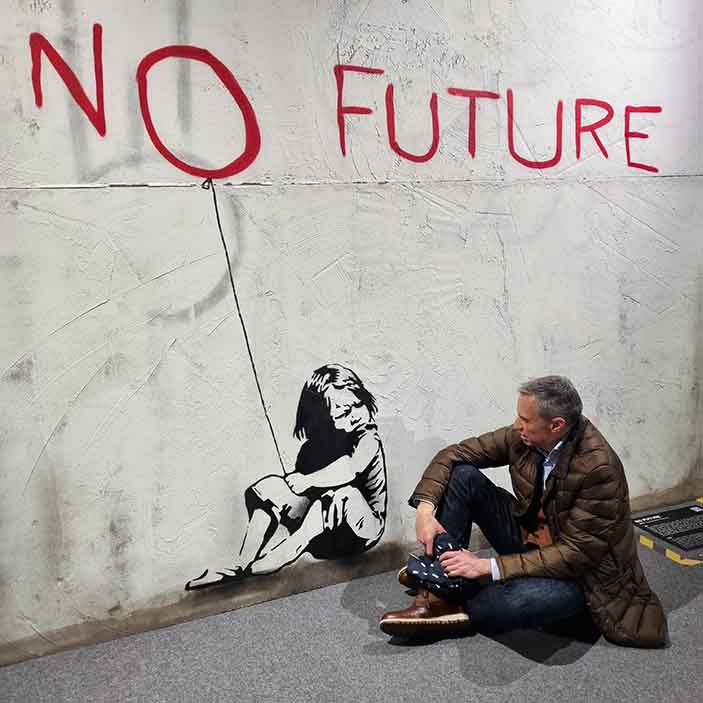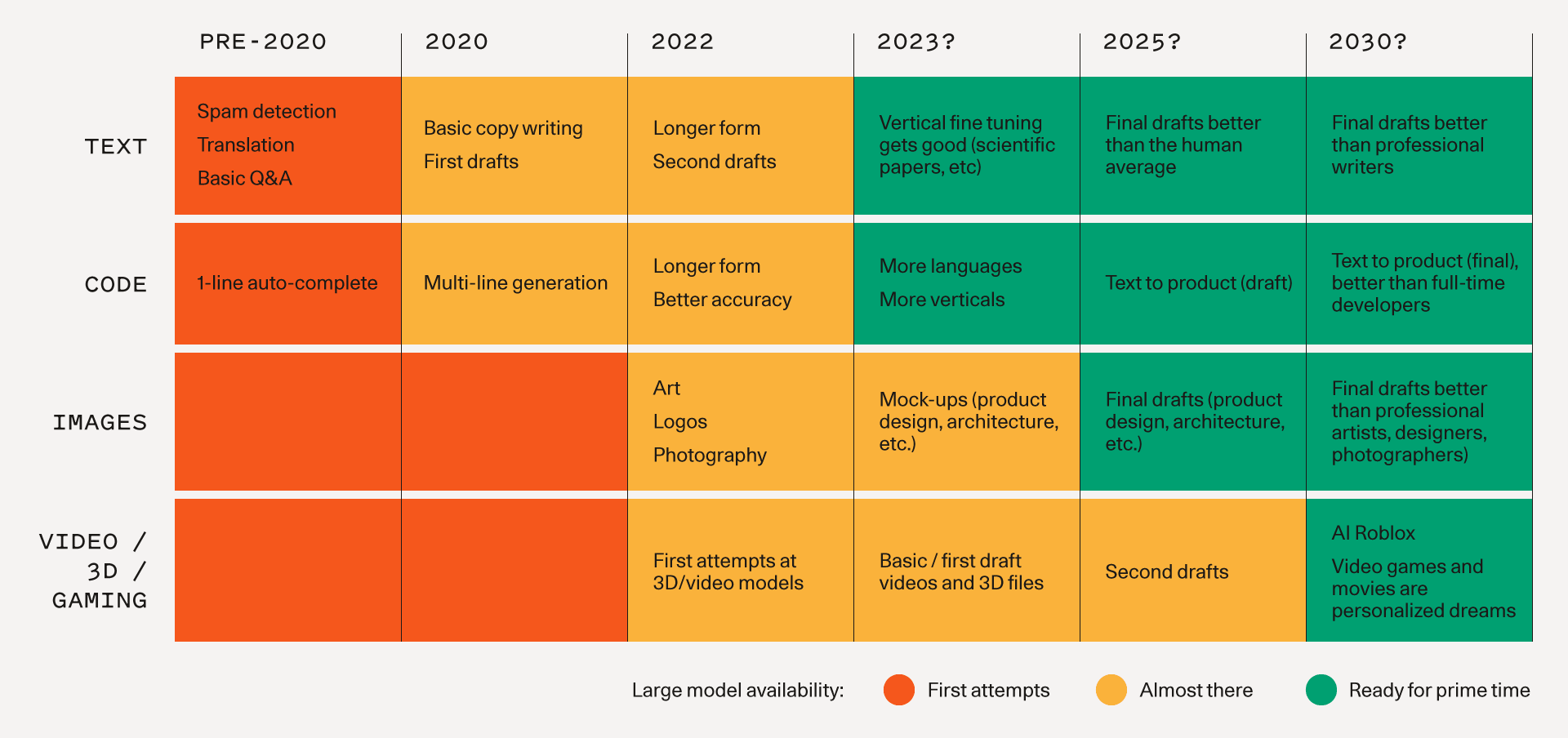If you don’t know the scope of the new generative AI tools, have a chatbot like ChatGPT create a concept for a topic you know well. If you’re not covering your mouth in amazement, you’ve made the wrong request.
AI tools will turn the world as we know it upside down.
Table of Contents
Artificial Intelligence (AI) can be a confusing and intimidating concept to wrap your head around.
But understanding the basics is key to unlocking the potential of AI and using it to its fullest.
This is an attempt to provide a framework for getting started with generative AI tools. There are several components that come into play when discussing this new breed of chatbots and generative AI tools, and understanding each one will help you better understand the topic as a whole.
How will AI tools affect you?
The Problem: The accelerating advances in artificial intelligence pose a threat to knowledge workers, leaving many unsure of how to stay employable or in business.
With several lists of endangered jobs circulating on the internet, including lawyers, programmers, and consultants, it’s clear that AI is already affecting many professions.
The consequences of these advances are unpredictable, leaving many feeling uncertain about the future of their careers.
To stay employable or in business, it’s important to demonstrate the courage to take gaps and adapt to the ever-faster accelerating development of AI.
This may involve acquiring AI techniques and skills to stay relevant in your profession, or exploring new opportunities that arise from the integration of AI into various industries.
As a knowledge worker, it’s important to have a strategy for dealing with the increasing threat or support from AI.
This may involve seeking out training or education to stay up-to-date on the latest AI developments, or finding ways to integrate AI into your work to enhance your productivity and efficiency.
Ultimately, the key to staying employable or in business in the face of AI is to remain flexible and adaptable, and to embrace new opportunities as they arise.
Whether you’re an employee or a services provider, it’s important to stay ahead of the curve and be proactive in responding to the changing landscape of the workforce.
What happened to the development of AI?
Why are we here in the first place?
Neither symbolic AI, which focused on using logic to solve problems, nor connectionist AI, which attempted to simulate the workings of the human brain, were able to create truly intelligent machines.
In the 1990s, a new approach called machine learning emerged. This approach focuses on developing algorithms that can automatically learn and improve from experience.
Machine learning has been extremely successful in recent years and is now responsible for many of the impressive achievements of AI, such as facial recognition, self-driving cars, and machine translation.
With the advent of chatbots like ChatGPT and the underlying Large Language Models LLMs, AI-powered tools are now available to anyone with a keyboard. They are used to generate all sorts of new content based on a simple text prompt. No coding required.
Why it matters to anyone who uses a keyboard
If you use a keyboard, chances are you’re interacting with AI every day.
Even if you don’t realize it, AI is probably powering the search engine you’re using, the social media platforms you’re scrolling through, and the email inbox you’re managing. In short, AI is everywhere, and it’s only getting more ubiquitous by the day.
Even with a minimal understanding of AI, you can start to think about the ways it’s impacting your life and the world around you.
Here are a few reasons why it matters to anyone who uses a keyboard:
- AI tools will help to automate repetitive and mundane tasks, freeing up time and energy for more creative and strategic work.
- AI tools can analyze and organize large amounts of data, providing valuable insights and information to support decision-making.
- AI tools can help to improve efficiency and productivity by streamlining workflows and reducing errors.
- AI tools may lead to changes in job responsibilities and skill requirements, requiring knowledge workers to adapt and learn new technologies.
What the evolution of AI means for knowledge workers
As artificial intelligence (AI) evolves, it will increasingly touch every aspect of our lives-including the workplace. For knowledge workers in particular, AI will present both challenges and opportunities.
On the one hand, AI will automate many tasks currently performed by human workers. This could reduce the demand for knowledge workers in certain areas and increase competition for jobs that cannot be automated.
On the other hand, AI will also create new opportunities for knowledge workers. For obvious reasons, those who are comfortable working with data and have experience in areas such as machine learning or natural language processing will be well-positioned to take advantage of new AI-powered tools and applications.
Either way, it is clear that the evolution of AI will have a significant impact on the future of work – and knowledge workers in particular.
The effects of AI on knowledge worker productivity and quality
In a study, Boston Consulting Group examined the performance implication of AI on knowledge-intensive tasks.
Consultants using AI were significantly more productive (completing 12.2% more tasks on average and 25.1% faster) and produced significantly higher quality results (more than 40% higher quality compared to a control group).

The directory There’s an AI for That publishes a Job Impact Index.
If you use a keyboard for a living, you're affected by AI.
Walter Schaerer

Speaking of productivity and impacted jobs: Here are my tips for creating videos efficiently. Without agency, director, copywriter and the whole staff…
How are we going to wrap our heads around AI?
Here’s my attempt to compile a framework for getting our heads around the implications of AI.
So far, these are just a few pointers from which I want to build the framework. Food for thought.
For humans, the pace is too fast
Given the exponential rate at which new AI applications are emerging, it’s impossible to keep up with what’s happening.
From a strategic perspective, the whole issue can no longer be overlooked.
That’s why I take tactical measures, such as testing as many AI tools as possible. This helps me to adapt my thinking to the new technical possibilities.
So far this has taught me the following:
- Coding assistance: I can now code in any language I need, say Python or C#. ChatGPT or Copilot will support me.
- Image generation: Creating image prompts in say Midjourney or DALL-E takes practice. And if you know a thing or two about design and photography, it will come in handy.
- Copywriting aids: Copy support tools like ChatGPT, frase.io or Jasper do an amazing job. They boost your productivity by several orders of magnitude.
- Question specificity: The more detailed and contextual your questions are, the more accurate the answers will be. If you get generic answers, your questions are not specific enough.
7,900+ AI tools available and counting
How can we tackle a task with confidence if we don’t know if there isn’t an AI that would do it in a blink of an eye?
In case you were wondering, probably there’s an AI for that. As of February 2023, the AI tool directory lists 1,831 AIs for 484 tasks like copywriting, video editing, slide creation, etc based on a simple text prompt.
It roughly doubles to 3,557 AIs for 989 tasks as per April 2023!
And as of September 2023 the directory doubles yet again and lists 7,907 AIs for 2,152 tasks, resulting in a job impact index of 4,847.
New tools appear on a daily basis at an increasingly rapid pace.
And the next wave of AI tools includes autonomous chatbots, i.e. chatbots that recursively generate their own prompts based on the results of previous steps.
All you have to do is give them an overall task and they will go about and solve it step by step. Read Matt Schlicht’s beginners guide here. Tools include AutoGPT, Baby AGI and Microsoft’s Jarvis.
Counterintuitively, AI killed creative jobs first
Contrary to expectations, AI has made creative jobs obsolete first: graphic designers or conceptual consultants are the first to be affected by the new chatbots.
What does that mean for your profession?
If you are in a coordinating role, you might be safe for now.
If you are a coder, you should start looking around for AI features like pair-programming based on chatbots. No kidding! Bug hunting is also very popular with chatbots.
If you are a copywriter or translator, try embracing your new aids as quickly as you can! Become an AI tool advisor or prompt engineer. Run as fast as you can!
If you are a consultant, use chatbots as your personal assistant. Ask them for comprehensive and complex concepts. You will be surprised!
Microsoft, Google, Facebook, Baidu, others?
Is Big Tech dominating the further development or will small, more flexible outlets lead the way?
What difference does it make if we know which business model is behind which chatbot response?
How do we teach our children AI literacy?
I don’t have an answer to this question at all yet:
If AI can do better math, better writing, better reasoning, better programming, what else are we teaching our children?
How are they supposed to learn to judge whether what the AI suggests to them is right or wrong?
And whose interests lie behind the suggestions when a chatbot is run by one Big Tech representative or another? How is their business model related to the answers?

Interesting reading
- A Conversation With Bing’s Chatbot Left Me Deeply Unsettled – The New York Times
- Sequoia Capital on the development of generative AI

Development of generative AI disciplines according to Sequoia Capital - Matt Schlicht on autonomous chatbots
What the talking head says in my video
The accelerating advances in artificial intelligence make it impossible to foresee their consequences.
Meanwhile, everyone who works with a keyboard is severely affected. How and with what consequences, is anyone’s guess.
Several lists of jobs that are acutely endangered are already circulating on the Internet. These include not only data typists, but also lawyers, programmers and consultants.
How should we deal with this development?
Is it possible to stay in such professions by acquiring AI techniques?
Will employees be replaced not by AI, but by new employees who use AI to support them?
If so, will there be less need for junior workers because seniors will be able to perform repetitive tasks, or compile information more efficiently themselves, thanks to AI?
How to proceed in such a situation where we have little long-term visibility, but are increasingly affected on a daily basis?
Inevitably, we will have to demonstrate the courage to take gaps, otherwise we will not be able to keep up with the ever faster accelerating development.
Are you also a knowledge worker?
What is your strategy?
How do you deal with the increasing threat, or support from AI?
As an employee, how do you stay employable? As a services provider, how do you stay in business?
